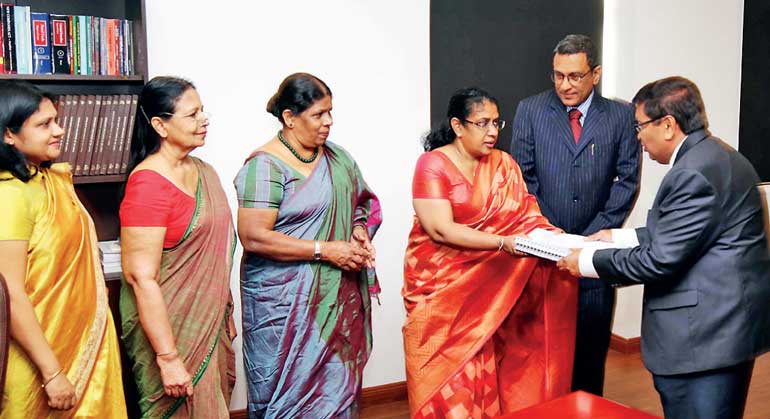Tuesday Feb 24, 2026
Tuesday Feb 24, 2026
Thursday, 25 January 2018 00:00 - - {{hitsCtrl.values.hits}}
 The Committee appointed to ‘Consider and Propose Reforms to the Muslim Matrimonial Law and Upgrading of Quazi Courts in Sri Lanka’ yesterday presented its final report to Justice Minister
The Committee appointed to ‘Consider and Propose Reforms to the Muslim Matrimonial Law and Upgrading of Quazi Courts in Sri Lanka’ yesterday presented its final report to Justice Minister
Thalatha Athukorale
Muslim Personal Law Reforms Action Group (MPLRAG) in a statement has welcomed the submission of the report by the Committee appointed to consider reforms to the Sri Lankan Muslim Marriage and Divorce Act (MMDA), to the Ministry of Justice, on 22 January 2018.
It said although it has taken considerable time, MPLRAG deeply appreciates the efforts of the Committee and their commitment to delivering solutions to the Muslim communities of Sri Lanka in addressing discriminations in the MMDA and Quazi court system. It thanked Justice Saleem Marsoof, the Chairperson of the Committee, for steering the process towards what we understand from media reports, to be a report that deals with a host of substantive concerns and includes suggestions for meaningful reforms. “We praise and appreciate Committee members who have worked tirelessly and fought for the principles of equality, justice and dignity within the Committee, amidst challenging deliberations and debates,” the statement from MPLRAG said.
Its statement also said the following:
We also acknowledge the efforts of Minister of Justice Thalatha Athukorale for hearing women and men on this process and ensuring that this Committee report was prioritised in the few months of taking office. We urge the Minister to continue to support this process through to the enactment of amendments and to ensure the space she has created for women in particular to be heard.
We believe it is vital in the spirit of community engagement and transparency for the Minister to make the report public without any further delay. Subsequently translating the report into Tamil and Sinhala, disseminating widely and publicising the content, and providing the Cabinet Sub-Committee with a timeline to present a bill to Parliament are administrative priorities in line with principles of good governance and accountability. Substantively, we ask the Minister to ensure Muslim women’s concerns remain central to the work of the Cabinet Sub-Committee. In this regard, we also appreciate the Parliamentarians who have supported the MMDA reform process to date and have been sensitive to the legitimacy of the voices of women in their deliberations.
We understand that the submission of the report by the Committee is just the beginning, as each individual recommendation for amendments to the MMDA will need to be considered in light of progressive interpretations of Islamic jurisprudence, constitutional guarantees of equality and non-discrimination, as well as other human rights standards and Sri Lanka’s international treaty obligations. We look forward to substantively engaging with the content and recommendations of the report once it has been made public.
The report, with dissenting views by some members of the committee as stated in media, is indicative of the deep divides in opinion and stances within the Muslim community on some aspects of MMDA reform. We are aware and want to call out the fact that regressive elements, uninformed opinions and attempts to derail the MMDA reform process have contributed to delays and friction within the communities, and will likely continue to do so. An effective counter to this we believe is to raise awareness and foster informed discussions among the members of the community and for the State to play a responsible role in law reforms towards all its citizens, including Muslim women and girls.
Thus we urge the Ministers of the Cabinet Sub-Committee, to whom matters now turn over, to honour the principles of justice, equality and dignity for Muslim women and girls in particular in moving forward. These are Sri Lankan voices least heard, these are the voices most grievously affected by the MMDA. The process must allow for these voices to be directly articulated. Your deliberations must be to address the real trials and tribulations that have led this reform process here. The expectations of the Muslim citizenry, of which Muslim women citizens account for 1,011,819, are high.
We conclude by honouring the work of the generations of Muslim women from all parts of the country who have struggled with unrelenting passion and commitment to improve the conditions for women and girls in the community. Many Muslim women and men have struggled hard, sometimes facing threats and insults in a very challenging and hostile environment, to address the injustice to women and girls due to this law. We are confident that together we will strive to ensure that reforms are reflective of Islamic values and fundamental human rights.
We believe, ensuring equality for Muslim women is at the heart of the struggle for equal citizenship, justice and dignity that Sri Lankan Muslims are striving for as a minority.